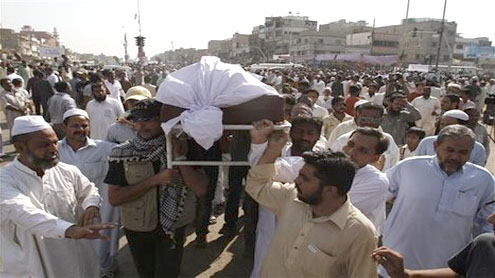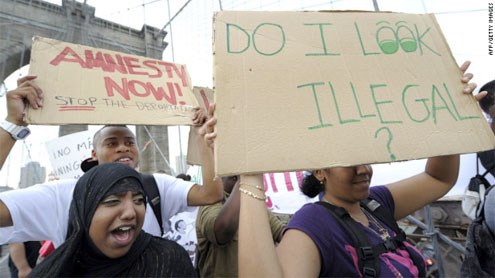 OR many months now for the 20 million residents of Karachi there is neither peace nor security, as violence erupts every other day taking heavy toll of life mainly of the innocent wayfarers. Then there are targeted-killings of political and ethnic rivals. Land-grabbing and extortionist gangs, who too prowl the streets to establish their writs, exhibit no hesitation in fighting it out in full public view. Equally disturbing is the sight of bodies stuffed in gunny bags that regularly turn up in various parts of the city, provoking robust reaction.
OR many months now for the 20 million residents of Karachi there is neither peace nor security, as violence erupts every other day taking heavy toll of life mainly of the innocent wayfarers. Then there are targeted-killings of political and ethnic rivals. Land-grabbing and extortionist gangs, who too prowl the streets to establish their writs, exhibit no hesitation in fighting it out in full public view. Equally disturbing is the sight of bodies stuffed in gunny bags that regularly turn up in various parts of the city, provoking robust reaction.
The carnage this ‘City of Lights’ suffered this Wednesday and Thursday in which over 50 people, including former MNA Waja Ahmad Karim Daad, had been killed in different incidents of violence – is being described as a gang war. According to reports from the violence-hit areas, gangs are fighting for turf, mainly in Lyari where a ‘vacuum of power’ created in the wake of Rahman Dakait has yet to be fully filled.
But if the violence permeating all over Karachi is grotesque in its proportions, no less spectacular is the failure of the law-enforcing agencies in establishing the writ of the government. Even with paramilitary forces like the Rangers requisitioned to beef up the city’s police force, the criminals show no fear of apprehension. Clearly the government has failed and the residents of Pakistan’s largest city, and rightly described as the hub of the nation’s business and industry, have been left at the mercy of the gangs and mafias. If the TV channels’ spot-coverage is any indication, the law-enforcing forces including the Rangers turn up only after the perpetrators of violence leave the scene.
There seems to be some kind of understanding between the police and the gangsters, as pointed out by the ruling party MNA Nabeel Gabol in a recent talk show that before coming to the place of their duty, the concerned police officers present themselves before the mafia dons, on whose recommendations they get their postings. What else then can be expected from a politicised police force? Only by de-politicising the police force can peace and tranquillity be restored in Karachi or anywhere else in the country. But we see no tangible move in this direction; in fact the opposite happens every time the political stakeholders hammer out a new arrangement of power-sharing.
The sad truth is that the government has no workable plan to control the violence in Karachi; its inability stemming as much from lack of comprehension of the situation as from the fact that almost all political outfits in Karachi have their arm-twisting wings, which are fielded unto the street as a counter-force if and when required to show party muscle. It is also a fact that various gangs and mafias also enjoy political patronage.
There is no dearth of sectarian extremists who, too, occasionally appear to register their patrons’ presence. Reports also indicate an influx of terrorists following the military operations in tribal areas. Then there are independently operating groups who sell their services to stage violence. And there is no shortage of weapons available to the criminals; if it were not so, the large quantity of licensed weapons are there to make it up. No doubt, the criminals are lethally armed; yesterday’s gang war in Lyari, where rivals fired rockets, grenades and what not at each other should be an eye-opener. The fact is that Karachi is too heavily weaponised to be effectively de-weaponised by a search operation. Even de-licensing wouldn’t work because weapons used by the criminals are mostly unlicensed.
Given the colossal failure of the government to restore calm and peace in Karachi and given the political stakeholders’ inability to divest themselves of their ‘militias’, an end to the recurrent violence doesn’t seem to be an achievable goal anytime soon. We are sinking deeper in chaos and anarchy with every passing day. Some may agree with S M Zafar that Pakistan is ripe for ‘Martial Law-plus’, like the one Bangladesh had sometime back when the army took over under the umbrella of a civilian head for a limited period of 18 months. But we won’t throw up our hands as yet. We do hope and expect the political leadership to stand up to this challenge, putting aside their inhibitions and reservations in the larger interest of peace and tranquillity for Karachi – because the alternative to it would be nothing but the end of all. – Dailmailnews













